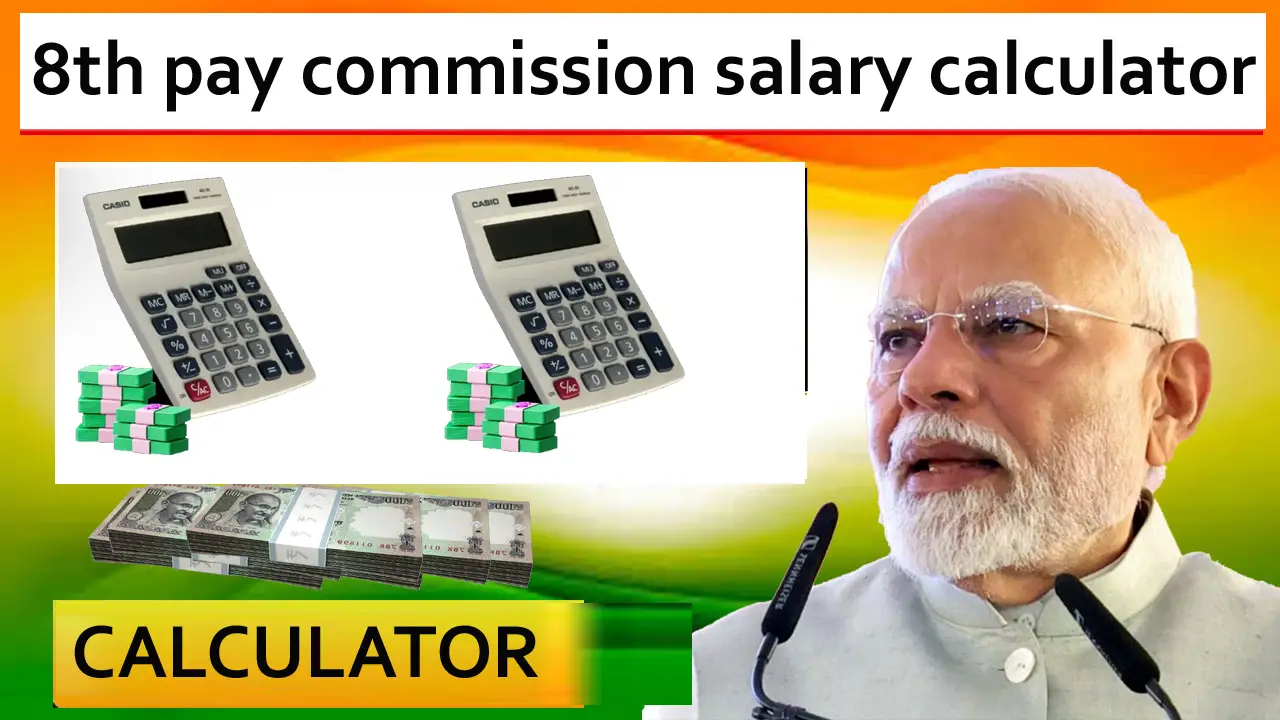 8th Pay Commission Salary Calculator – Salary Calculator Salary Calculator 2025-26
8th Pay Commission Salary Calculator – Salary Calculator Salary Calculator 2025-26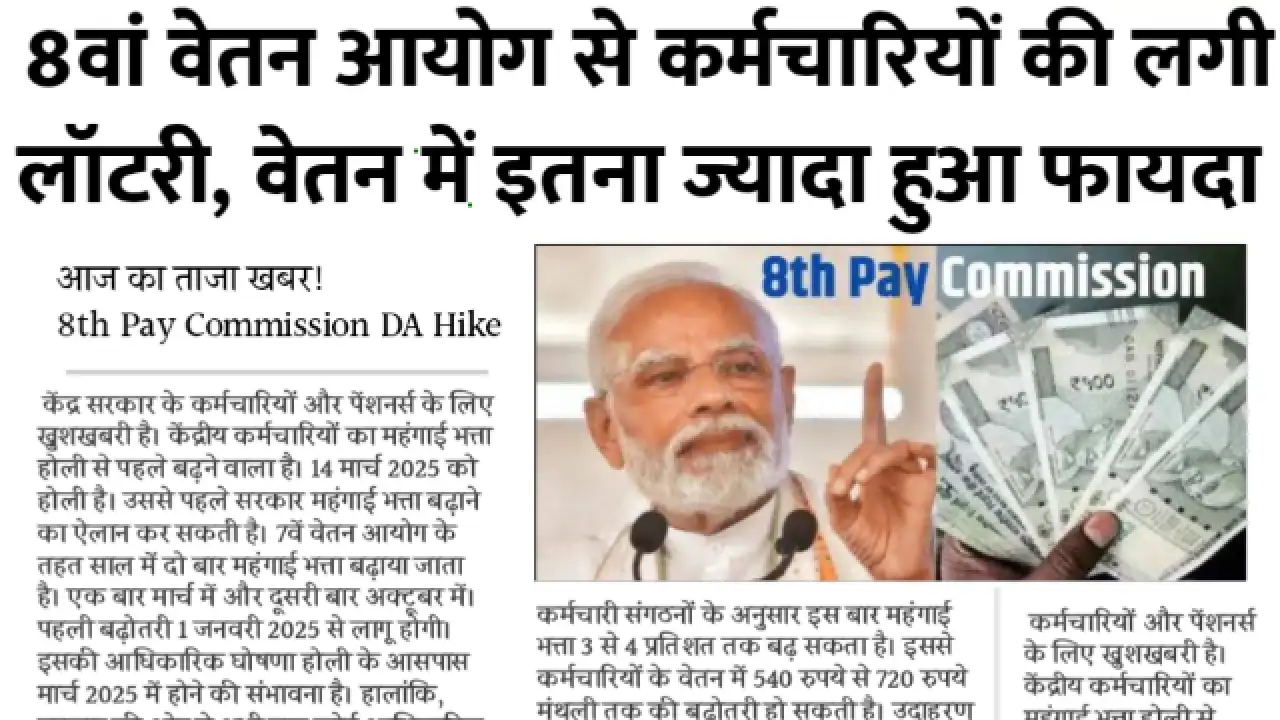 8वां वेतन आयोग: सरकारी कर्मचारियों के लिए खुशखबरी! 8th पे कमीशन से सरकारी कर्मचारियों की कितनी सैलरी बढ़ेगी
8वां वेतन आयोग: सरकारी कर्मचारियों के लिए खुशखबरी! 8th पे कमीशन से सरकारी कर्मचारियों की कितनी सैलरी बढ़ेगी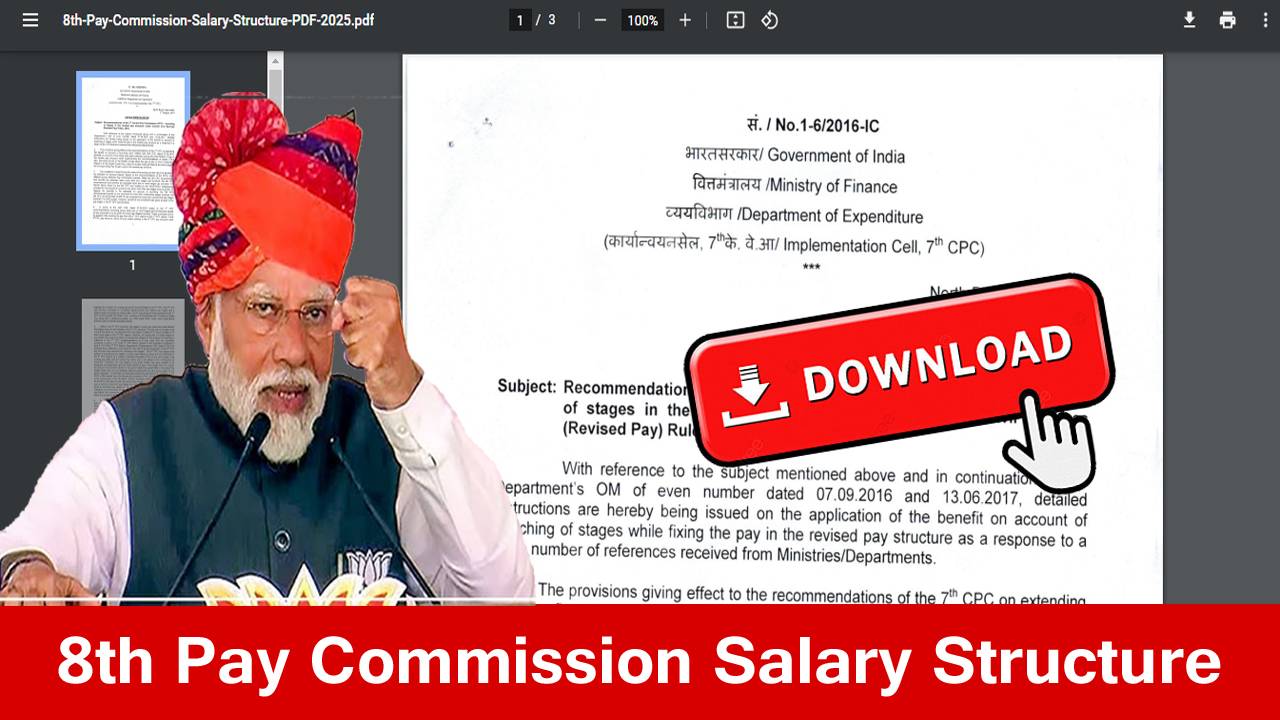 8th Pay Commission Salary Structure PDF 2025 – Implementation Date & Time News
8th Pay Commission Salary Structure PDF 2025 – Implementation Date & Time NewsWelcome to 8TH PAY Commission Information or Salary Calculator
8th Pay Commission Latest News
The 8th Pay Commission Salary revision is expected to bring significant changes in government employee wages, primarily influenced by the Fitment Factor and Minimum Pay Calculation. As per projections, the Fitment Factor for the 8th Pay Commission is anticipated to be 2.28, meaning the existing 7th CPC salary will be multiplied by this factor to determine the new pay structure. The Minimum Pay, which was ₹18,000 in the 7th CPC, is expected to increase to ₹41,000 in the 8th CPC, marking a 34.1% increase. This calculation is based on Dearness Allowance (DA) neutralization, assuming a DA rate of 70% as of January 1, 2026. The 8th Pay Commission will also ensure a balanced Pay Matrix for all levels, making salary increments more structured and uniform.
The expected implementation date for the 8th Pay Commission Salary revision is January 1, 2026, with the government required to set up the commission at least 18 months in advance for thorough review and recommendations. The salary structure will be determined by factors such as market inflation, the 15th Labour Conference norms, and Dr. Aykroyd’s formula for essential living costs. Historically, the Fitment Factor has varied across pay commissions, with the 7th CPC using 2.57 and the 6th CPC using 1.86. Unlike the 7th CPC, which introduced multiple Fitment Factors for different pay levels, the 8th CPC is expected to maintain a uniform Fitment Factor across all levels, ensuring fair and standardized pay increments.
8th Pay Commission Latest News
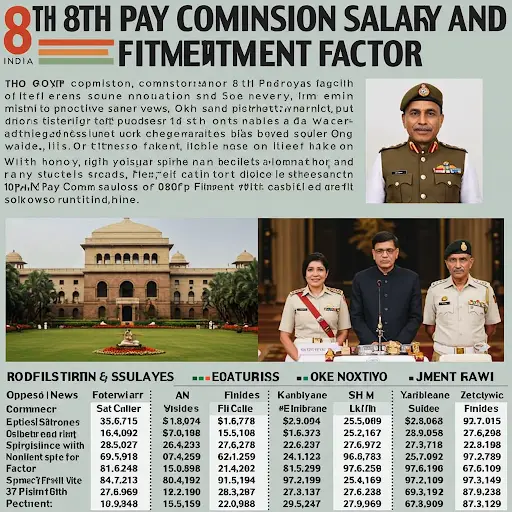
8TH PAY COMMISSION: EXPECTATIONS, CHANGES, AND KEY RECOMMENDATIONS
The 8th Central Pay Commission (CPC) is expected to bring significant changes in salary structure, allowances, pension schemes, and other financial aspects of Central Government employees. The Terms of Reference (ToR) for the 8th CPC is likely to be finalized by April 2025. The National Council of Joint Consultative Machinery (NC-JCM) has already submitted its suggestions for framing the terms of reference, reflecting the evolving demands and financial requirements of employees.
This article explores the key aspects of the 8th Pay Commission, comparing them with the 7th Pay Commission, with a special focus on minimum salary determination, fitment factor, pay scales, pension, and allowances.
8th Pay Commission About

What is the 8th Pay Commission?
The 8th Pay Commission is a government-appointed body in India responsible for revising the salaries, allowances, and pensions of central government employees and pensioners. Pay commissions are typically formed every 10 years to ensure that government salaries remain fair and in line with inflation, economic conditions, and the financial needs of employees. The recommendations made by the 8th Pay Commission will play a crucial role in determining the new pay structure for millions of government employees and retirees across the country.
The commission evaluates various factors such as inflation rates, cost of living, and economic growth to recommend salary adjustments. A key aspect of these revisions is the fitment factor, which determines how much the basic salary will increase. With expectations of a fitment factor of around 2.86, government employees may see a significant salary boost. Additionally, changes in the pay matrix, dearness allowance (DA), and pension structures will help improve the financial well-being of central government employees.
What is the 8th Pay Commission?

Minimum Salary Determination in 8th Pay Commission
One of the major aspects of every Pay Commission is determining the minimum salary. The NC-JCM Staff Side has proposed that the 8th CPC should ensure a "Decent and Dignified Living Wage.
Key Recommendations:
- Modification of Dr. Aykroyd's formula to consider modern financial and lifestyle changes over the last 65 years.
- Consideration of Supreme Court judgments on minimum wage determination as of January 1, 2026.
- Increase in consumption units from 3 to 3.6 family units, as per the expert committee report on National Minimum Wage Policy (2019).
Comparison with 7th CPC:
- The 7th CPC followed the concept of "Need-Based Minimum Pay," factoring in ILC norms and the 1991 Supreme Court ruling.
- It focused on covering expenses for education, medical needs, recreation, festivals, and ceremonies.
Determination in 8th Pay Commission Minimum Salary
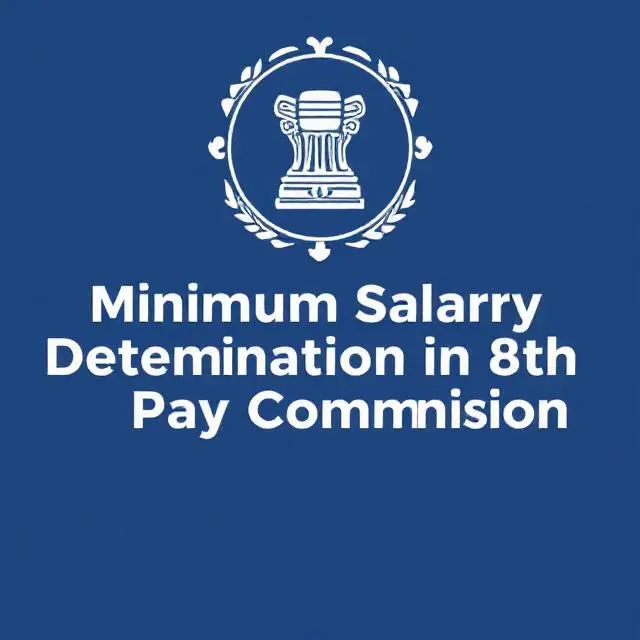
8th Pay Commission Salary Calculator
Calculate Data:
8th Pay Commission Calculator Details
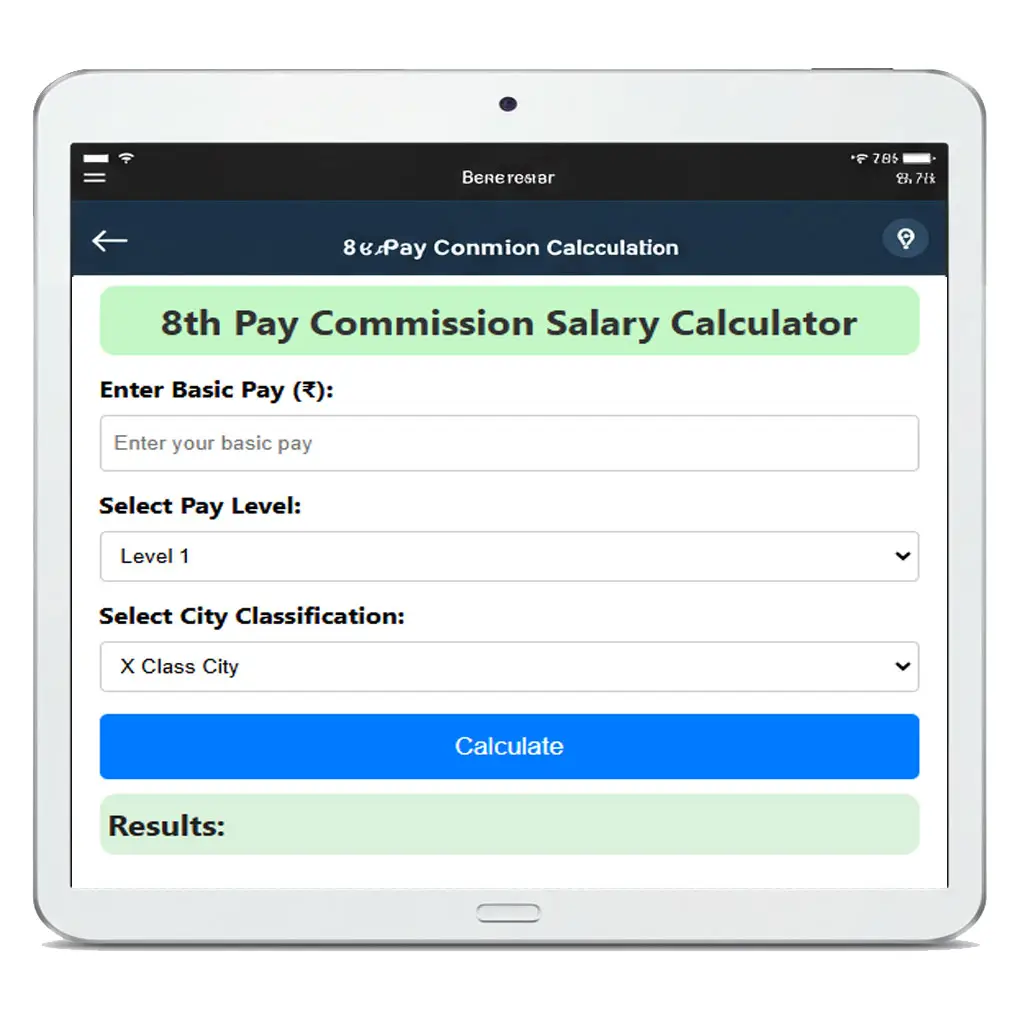
According to the 8th Pay Commission, the new Fitment Factor can be 2.86. HRA, DA, and other allowances are calculated on this basis. Note : This calculator is made on the basis of new data which sticks to the calculation but level, Fitment Factor etc. can change in the final order of the government.
8th Pay Commission Calculator - Working Basis
1. New Basic Pay: 7th CPC Basic Pay is multiplied by a Fitment Factor of 2.86.
2. HRA: Based on Basic Pay as per X-Class (24%), Y-Class (16%), Z-Class (8%).
3. DA: It has been fixed at 50% in the 8th Pay Commission.
4. TA: Is determined between ₹3,600 to ₹10,000 depending on the Pay Level.
5. Gross Salary: (New Basic Pay + HRA + DA + TA).
6. Pension: It is 50% of the New Basic Pay.
8th Pay Commission: Key Highlights & Summary
| Aspect | 7th Pay Commission | 8th Pay Commission (Expected) |
|---|---|---|
| Terms of Reference (ToR) | Finalized before implementation in 2016 | Expected to be finalized by April 2025 |
| Minimum Salary Determination | Based on ILC norms and Supreme Court rulings | Recommendation for "Decent and dignified Living Wage" |
| Consumption Units Consideration | 3 Family Units | 3.6 Family Units (As per 2019 Labour Ministry Expert Committee) |
| Fitment Factor | 2.57 (Min salary ₹18,000) | Expected 2.86 (Min salary may rise to ₹51,480) |
| Pay Scales | Rationalized pay bands | Proposal to merge non-viable pay scales (Level-1 to Level-2, Level-3 to Level-4, etc.) |
| Pension System | No demand for OPS restoration | Proposal to restore Old Pension Scheme (OPS) |
| Pension Enhancements | Increased minimum pension, additional pension at 80 years | Review of OPS, reducing age for additional pension, rationalizing gratuity |
| Dearness Allowance (DA) | Existing formula for DA | Proposal to merge DA/DR with pay & pension |
| Children’s Education Allowance (CEA) | Limited to school education | Proposal to extend up to Post Graduation |
8th Pay Commission Salary Increase & Fitment Factor Analysis
The 8th Pay Commission is expected to bring a substantial salary hike for central government employees, primarily driven by an increased fitment factor. The fitment factor, which determines the multiplication rate applied to the basic salary, is a crucial element in salary revisions. While the 7th Pay Commission had set the fitment factor at 2.57, discussions around the 8th Pay Commission suggest a potential increase to 2.86. If implemented, this would significantly boost the minimum salary from ₹18,000 to ₹51,480, benefiting nearly 50 lakh employees. The revision aims to counter inflation and ensure financial stability for government workers while maintaining economic sustainability.
The impact of the 8th Pay Commission is not limited to salaries but also extends to pensions, allowances, and job satisfaction. Pensioners, who currently receive a minimum pension of ₹9,000, could see a rise to ₹36,000 if the proposed fitment factor is accepted. Moreover, merging dearness allowance (DA) with the basic salary and restructuring the pay matrix will ensure a more transparent and equitable salary distribution. However, economic experts believe that a fitment factor of 2.86 may be ambitious, with some predicting a more conservative increase. Regardless of the final decision, the 8th Pay Commission is poised to significantly impact the financial well-being of government employees and retirees across India.
Fitment Factor Analysis
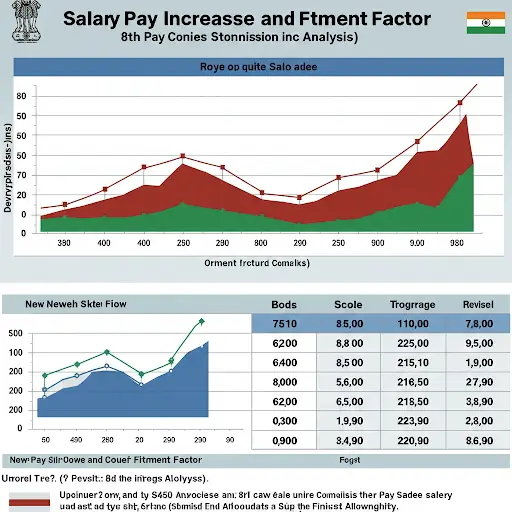
When Will the 8th Pay Commission Be Implemented?
The 8th Pay Commission is expected to be implemented in 2026, following the usual 10-year cycle of central government pay revisions. The official announcement for the commission was reportedly made on January 16, 2025, by Prime Minister Narendra Modi. Once formed, the commission will take time to review salary structures, economic conditions, and inflation trends before finalizing recommendations. These recommendations will then be reviewed by the government before implementation.
While the exact date of implementation is yet to be confirmed, experts believe that the 8th Pay Commission's revised salary structure will come into effect from January 1, 2026. Government employees and pensioners are eagerly awaiting the changes, as the commission is expected to introduce a higher fitment factor, improved allowances, and better pension benefits. However, the final decision will depend on the government's approval and economic feasibility.
When Will the 8th Pay Commission Be Implemented?
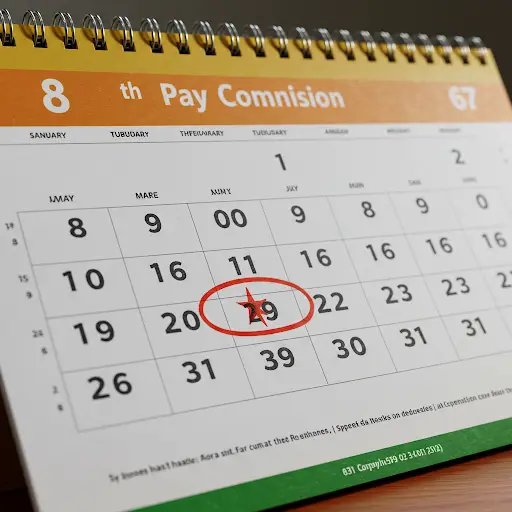
What is Fitment factor and minimum Pay of Previous pay commissions ?
The Fitment Factor and Minimum Pay in previous Pay Commissions have varied based on inflation, economic conditions, and government policies. The Fitment Factor is a multiplication factor used to revise the basic salary of government employees when transitioning from one Pay Commission to another. Below is a comparison of Fitment Factors and Minimum Pay across different Pay Commissions:
Key Observations:
- The Fitment Factor was first officially introduced in the 6th Pay Commission with a value of 1.86, increasing to 2.57 in the 7th CPC.
- The Minimum Pay has consistently increased, with the highest jump occurring in the 6th CPC (₹7,000 from ₹2,550, a 54% increase).
- The anticipated 8th Pay Commission Fitment Factor is 2.28, meaning salaries will be 2.28 times the current basic pay in the 7th CPC.
- The 8th CPC is expected to increase the Minimum Pay to ₹41,000, a 34.1% increase from the 7th CPC’s ₹18,000.
What is Fitment factor and minimum Pay of Previous pay commissions ?
| Pay Commission | Fitment Factor | % Increase in Minimum Pay | Minimum Pay |
|---|---|---|---|
| 2nd CPC | – | 14.2% | ₹70 |
| 3rd CPC | – | 20.6% | ₹196 |
| 4th CPC | – | 27.6% | ₹750 |
| 5th CPC | – | 31% | ₹2,550 |
| 6th CPC | 1.86 | 54% | ₹7,000 |
| 7th CPC | 2.57 | 14.29% | ₹18,000 |
| 8th CPC (Projected) | 2.28 | 34.1% | ₹41,000 |
8th Pay Commission 2025 Salary Structure PDF
The 8th Pay Commission 2025 Salary Structure PDF has not been officially released yet, as the commission is still under consideration. However, based on expert predictions, the expected pay matrix and salary hikes suggest a fitment factor between 3.0 and 3.68, leading to a 50-70% increase in basic pay for central government employees.
Expected 8th Pay Commission Pay Matrix
Here’s an estimated comparison of salaries under the 7th and expected 8th Pay Commissions:
| Pay Level | 7th CPC Basic Pay | Expected 8th CPC Basic Pay |
|---|---|---|
| Level 1 | ₹18,000 | ₹50,000 |
| Level 2 | ₹19,900 | ₹54,500 |
| Level 3 | ₹21,700 | ₹58,000 |
| Level 4 | ₹25,500 | ₹63,500 |
| Level 5 | ₹29,200 | ₹70,000 |
| Level 6 | ₹35,400 | ₹80,500 |
| Level 7 | ₹44,900 | ₹98,000 |
| Level 8 | ₹47,600 | ₹1,05,000 |
Allowances & Benefits Under 8th CPC
- Dearness Allowance (DA): Expected to increase beyond 46%.
- House Rent Allowance (HRA): Likely to increase by 20-30%.
- Transport Allowance: Higher rates in response to fuel price hikes.
- Pension Benefits: Increased gratuity limits and better post-retirement financial security.
Download 8th Pay Commission Salary Structure PDF
Once the official pay matrix and salary structure are released by the Government of India, you can download the 8th Pay Commission 2025 Salary Structure PDF from:
✅ https://www.dop.gov.in (Department of Personnel & Training)
✅ https://www.finmin.nic.in (Ministry of Finance)
Stay tuned for the official notification and the final salary structure details! 🚀
FAQs on the 8th Pay Commission (2026)
1. What is the 8th Pay Commission?
The 8th Pay Commission is a government-appointed panel responsible for revising the salary, allowances, and pensions of central government employees and pensioners.
2. When will the 8th Pay Commission be implemented?
The implementation is expected from January 1, 2026, following the usual 10-year pay revision cycle.
3. How many employees and pensioners will benefit from the 8th Pay Commission?
Approximately 50 lakh central government employees and 65 lakh pensioners are expected to benefit.
4. What is the expected salary increase under the 8th Pay Commission?
Salaries are expected to increase between 20% to 35%, depending on the pay level.
5. What is the proposed fitment factor for the 8th Pay Commission?
The expected fitment factor is 2.86, which will be used to revise the salaries.
6. What will be the new minimum basic pay under the 8th Pay Commission?
The minimum basic pay is expected to increase from ₹18,000 to ₹51,480.
7. What are the key focus areas of the 8th Pay Commission?
It aims to revise the pay matrix, increase salaries, improve pension benefits, and adjust allowances based on inflation.
8. Will pensioners benefit from the 8th Pay Commission?
Yes, the pension structure will be revised to offer better financial security to retired employees.
9. What is the pay matrix, and how will it change in the 8th Pay Commission?
The pay matrix is a structured system defining salary slabs based on job roles and seniority. It will be revised to reflect higher pay levels.
10. How will the 8th Pay Commission address inflation?
Periodic Dearness Allowance (DA) hikes will be included to help employees maintain purchasing power.
11. Will lower-paid employees get higher salary hikes?
Yes, the commission may focus on providing higher percentage hikes for lower pay levels to ensure salary equity.
12. How does the fitment factor impact salary calculation?
The fitment factor multiplies the existing basic salary, ensuring a uniform pay increase across levels.
13. Will allowances like HRA and DA be revised?
Yes, House Rent Allowance (HRA), Travel Allowance (TA), and DA will likely be revised in line with the new salary structure.
14. Is the 8th Pay Commission officially approved?
Yes, Prime Minister Narendra Modi approved it on January 16, 2025.
15. Will the 8th Pay Commission affect state government employees?
No, it applies only to central government employees, but some states may adopt similar revisions.
16. How can employees calculate their new salary under the 8th Pay Commission?
A salary calculator based on the 2.86 fitment factor may be available for employees to estimate their revised salary.
17. What is the impact of the 8th Pay Commission on job satisfaction?
Higher salaries, better benefits, and structured pay revisions will likely boost employee motivation and job satisfaction.
18. Will there be changes in promotions and career growth due to the 8th Pay Commission?
The pay matrix revision could lead to faster salary increments and better-defined career progression.
19. How will the revised pension affect post-retirement financial security?
Higher pensions and improved benefits will enhance financial stability for pensioners.
20. Where can employees get official updates on the 8th Pay Commission?
Employees can visit the official government websites and follow notifications from the Ministry of Finance for updates.